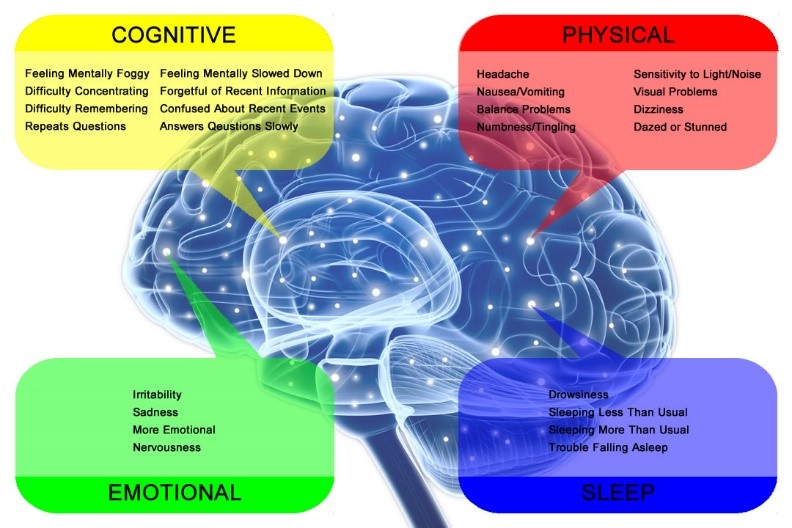
3-100 Wallace Street
Nanaimo, BC

Nanaimo, BC
Concussion Rehabilitation
Bridge Physiotherapy and Massage is an Impact Certified Concussion Clinic.
We can perform pre and post injury baseline testing utilizing the Impact Software Program.
Post injury treatment is dependent on which aspects of brain function have been impacted by the injury, and may range from Cold Laser to “recharge” the brain to physical exertion training prior to return to sports/activities.

What are the symptoms of a concussion?
Some common symptoms often reported with concussive injuries include:
What happens to the brain during a concussion?
A direct or indirect blow to the head, face or jaw can cause the brain to accelerate then rapidly decelerate within the skull. This acceleration/deceleration motion can induce mechanical changes to the nerve fibres – causing them to stretch – and in turn, alter several important metabolic pathways. Though injury is apparent given the spectrum of symptoms experienced by a concussed athlete, no structural damage is caused to the brain itself. That is, unlike other sports injuries (like a fractured wrist or dislocated shoulder) nothing appears abnormal on standard imaging studies like CT, or MRI. Instead, these imaging methods are used to rule out more severe trauma such as bleeding within the brain or skull or fractures of the skull or neck. We understand now, more than ever, that just because we can’t see the injury, it doesn’t mean that something’s not wrong.
Current evidence suggests that the rapid stretch of nerve fibres within the brain during a concussive trauma results in the release of various neurotransmitters (signalling molecules within the brain), which trigger the initiation of a complex neurometabolic pathway. Ultimately an energy crisis ensues, and the brain is unable to produce the energy required to sustain its normal processes. These changes take place within minutes of the injury and can last for hours or days before normalization occurs. It is thought to be this metabolic imbalance, along with other impaired physiological processes that contribute to the physical, cognitive, behavioural and emotional signs and symptoms typically seen in a concussed individual.
What is the recovery timeframe after a concussion?
The majority of concussion-related symptoms are thought to resolve in a short timeframe (days to weeks); however in some, symptoms may persist for months:
Why some athletes seem to recover quickly and others do not remains unclear. Even when symptoms resolve quickly it is advisable that a proper gradual return-to-play protocol be carried out. The whole recovery process therefore may take upwards of 3-4 weeks (at minimum) to prevent premature return to sport.
Post-concussion syndrome is a diagnostic term used when symptoms persist for several weeks and sometimes months after the injury. If your symptoms persist beyond 3-4 weeks it is important that you undergo proper medical assessment (or re-assessment) in order to receive the right education and management strategies for your condition.
I think I may have a Concussion. What should I do?
STEP 1
Make sure that you tell someone (your coach, parent, teacher etc.) so that you are not left alone. Remove yourself from sport, class, and/or work until a Medical Physician can properly assess you. Complete rest is the best treatment during the initial hours of the injury.
STEP 2
Schedule an appointment to see a Medical Physician as soon as possible. It is not usually necessary to visit the emergency room unless your symptoms are severe and/or rapidly worsening. It is not usually necessary to have someone wake you in the night – get a good night’s sleep, and nap when you need to. Limit use of your phone, television, and computer – try to rest both your body and your brain.
STEP 3
Undergo proper medical evaluation by a Physician. This does not typically include CT or MRI unless more severe injury is suspected or needs to be ruled out.
STEP 4
Visit one of the Concussion Management clinics in your area for further assessment. If you have previously undergone baseline testing, repeat testing will demonstrate any areas that may be impaired due to the injury and will help guide management recommendations. If you have not previously undergone baseline testing, a follow-up assessment with one of our Health Professionals is still highly recommended.
STEP 5
Follow any management recommendations given to you by your Physician and other Health Professionals. These may include manual therapy (e.g. for associated neck pain), specific rest strategies and home recommendations, modified school and/or work requirements, specialized rehabilitative techniques (eg. vision therapy), and other recovery strategies.
STEP 6
Follow-up with the Health Professionals involved in your care so that your recovery is properly monitored. If you have questions – ask! Knowledge of your injury will aid in your recovery.
© 2022 All rights reserved Bridge Physiotherapy